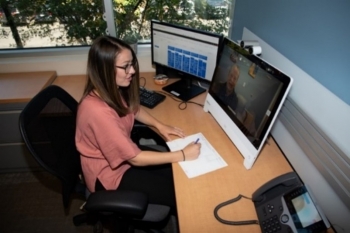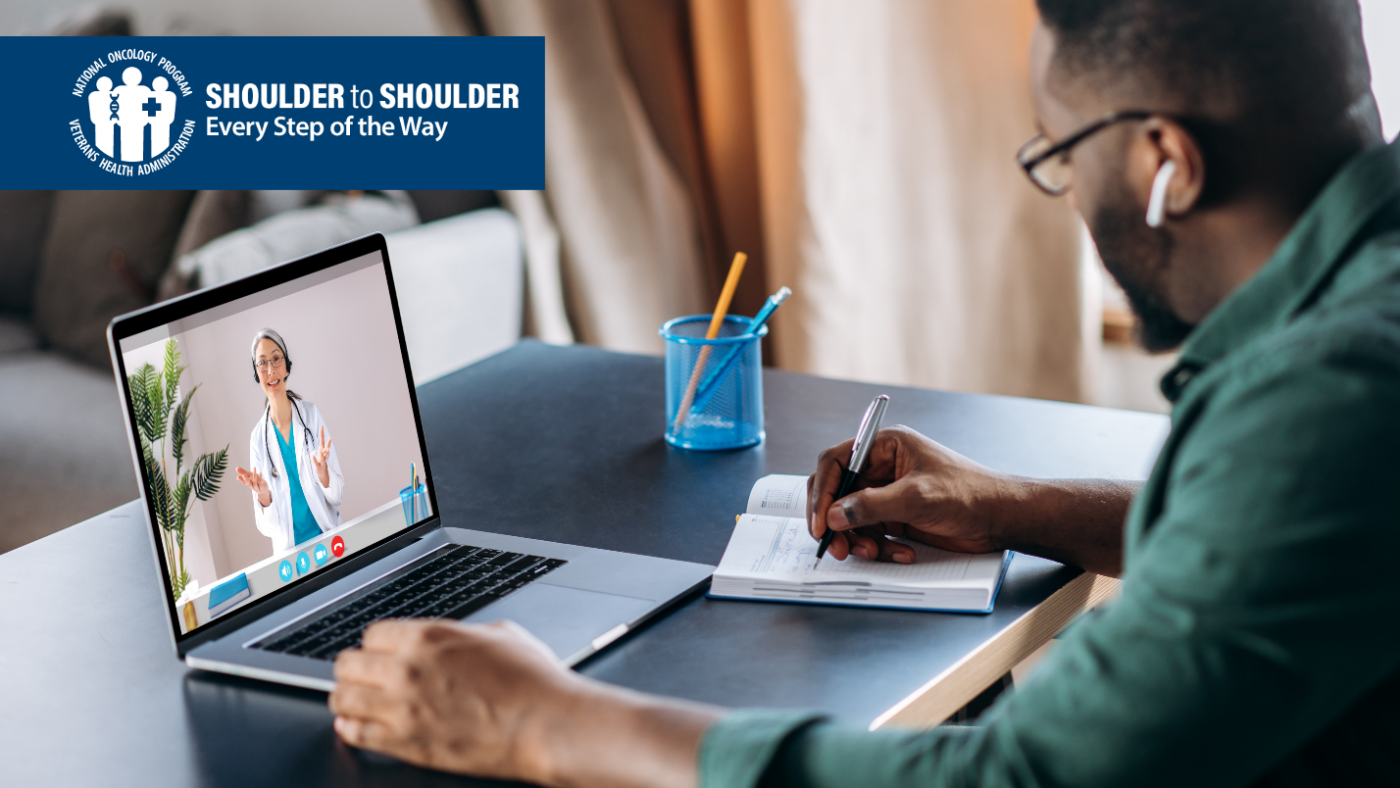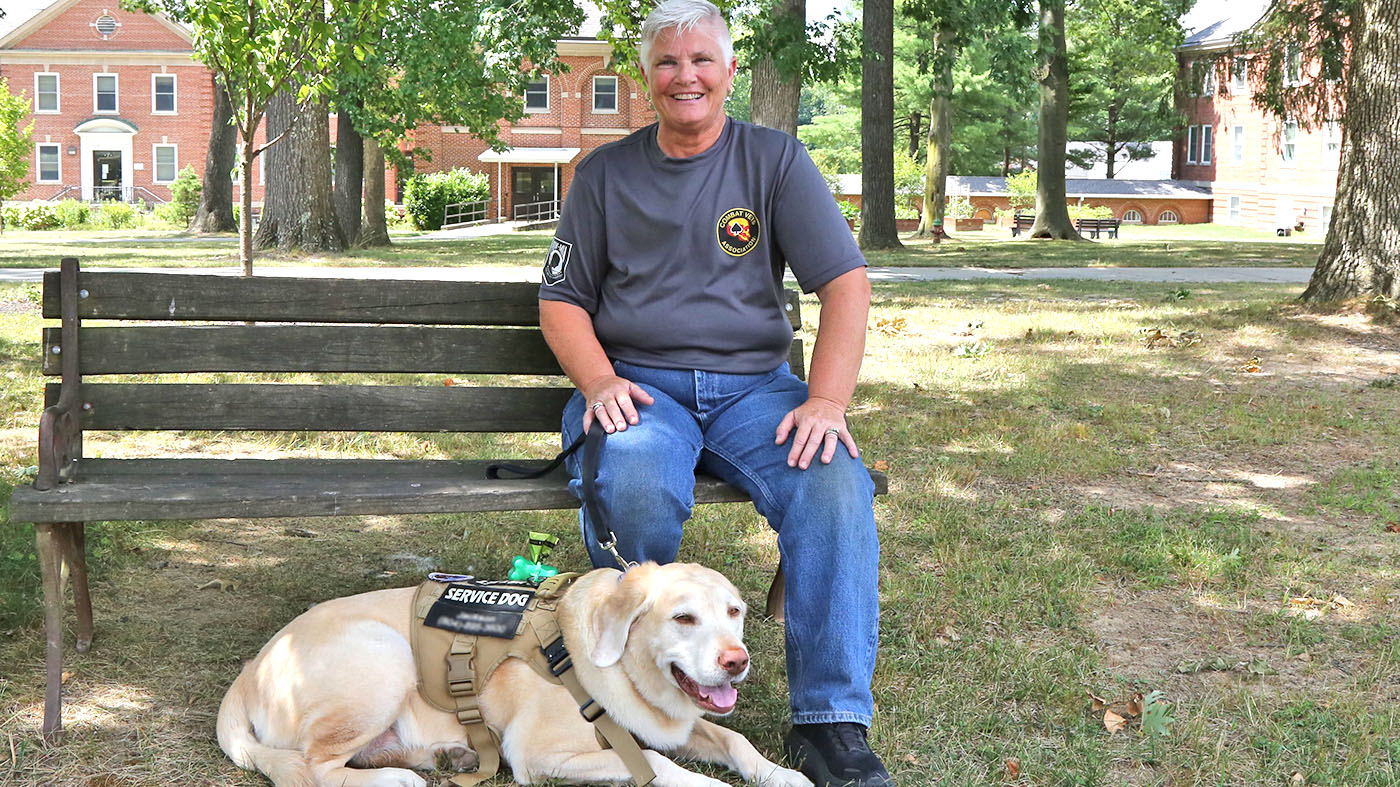
Thanks to NTO, Veterans can connect with cancer specialists without a long drive, saving time and expense.
When Air Force Veteran Jackson Gerrard was diagnosed with myelodysplastic syndrome – a form of blood cancer – he was overwhelmed.
“When I was first told, it was like running into a brick wall,” said Gerrard. “Thoughts went running through my head and I thought, what are the consequences?”
The steadfast care of Gerrard’s oncologist, Dr. Thomas Rodgers at the Durham VA Health Care System, provides him comfort through the stress of treatment. Gerrard is currently receiving chemotherapy for his cancer.
“You need to have faith and trust in your doctor,” said Gerrard.
The high-quality care is what Gerrard expected from VA, but the way he receives it is a bit different than the average oncology consult. For his appointments, Gerrard drives 15 minutes to the Clarksburg VA Medical Center in West Virginia to meet with Rodgers via clinical video telehealth (CVT). CVT allows Gerrard to meet with a top blood cancer specialist like Rodgers, who is located over 300 miles away in Durham, North Carolina. If Gerrard had to drive to Durham, it would take him nearly 6 hours.
Increasing access to cancer care through TeleOncology
Veterans enrolled in VHA are two and a half times more likely to live in rural areas. These regions face significant disparities in health care access, including for cancer. An American Society of Clinical Oncology (ASCO) workforce report notes that 66% of rural counties have no oncologist. According to the report, 4 in 10 Americans living in rural areas who have or had cancer say there are no cancer specialists near their home.
VA’s National Oncology Program’s National TeleOncology Program (NTO) is working to be part of the solution. Thanks to NTO, Veterans can connect with cancer specialists without a long drive, saving time and expense. Around the country, Veterans connect with NTO in two different ways: through CVT, like Gerrard, or via an internet-connected device in their own home through VA Video Connect (VVC).
“Although I drove tractor trailers for 39 years, I don’t like traveling much now,” said Gerrard. “I just need to drive 15 minutes for my appointments with Dr. Rodgers. I have one of the VA nurses in the room with me, and my wife can attend appointments. So far, I have had no problems with it.”
Veterans who are interested in learning more about cancer care at VA can visit cancer.va.gov or email cancer@va.gov.
A rewarding career path
TeleOncology benefits more than the Veterans who use the service. The oncologists who provide the care find purpose in serving our nation’s heroes all over the country.
“Providing care to patients like Mr. Gerrard is why I became an oncologist,” said Dr. Rodgers. “With TeleOncology, I have the opportunity to reach Veterans all over the country. I never imagined having this level of impact when I first began my career. I am able to serve people who would otherwise have very limited options.”
NOP currently has opportunities to join the best-in-class oncologists like Rodgers providing care via TeleOncology. In this position, you will:
- Promote, direct, evaluate and oversee the management of high-quality patient care delivery
- Provide hematology/oncology care by telehealth
- Join heroes serving heroes at the largest integrated provider of oncology care in the nation
Be part of the future oncology care, standing shoulder to shoulder with the heroes providing cancer care for our nation’s Veterans.
Work at VA Today
- Apply today at USAJobs.gov
- Read about the 20 Reasons Doctors like Working for the Veterans Health Administration
- Learn more about NOP at cancer.va.gov
- Email cancer@va.gov to learn more
NOTE: Positions listed in this post were open at the time of publication. All current available positions are listed at USAJobs.gov.
Topics in this story
More Stories
Combat Veteran faces the traumatic events of her PTSD during prolonged exposure therapy and looks forward to the days to come.
Bob Jesse Award celebrates the achievements of a VA employee and a team or department that exemplifies innovative practices within VA.
The Medical Foster Home program offers Veterans an alternative to nursing homes.







When first approached with this several years ago I told the Chief of Staff ‘You have got to be kidding”. I thought how can we deny these patients who are going through one of the worst diagnosis you can get the comfort of “hands on care”. I get it now. There is no way that our small little community in Clarksburg WV would ever be able to have a team of first class oncologists, who through many years of training, sub-specialize in specific cancers. The Oncologists in Durham that I was fortunate enough to work with were caring and very involved in their patient’s lives. I was amazed at their knowledge. The only thing they could not do was hand out hugs or hold their hands when needed. Fortunately that is where nurses excel and as a team It has worked very well and our patients were grateful. Great Job Jack on the interview. Thanks to the whole tele-oncology team for making this program available to our veterans.
Pam Snyder, RN, BSN,MS